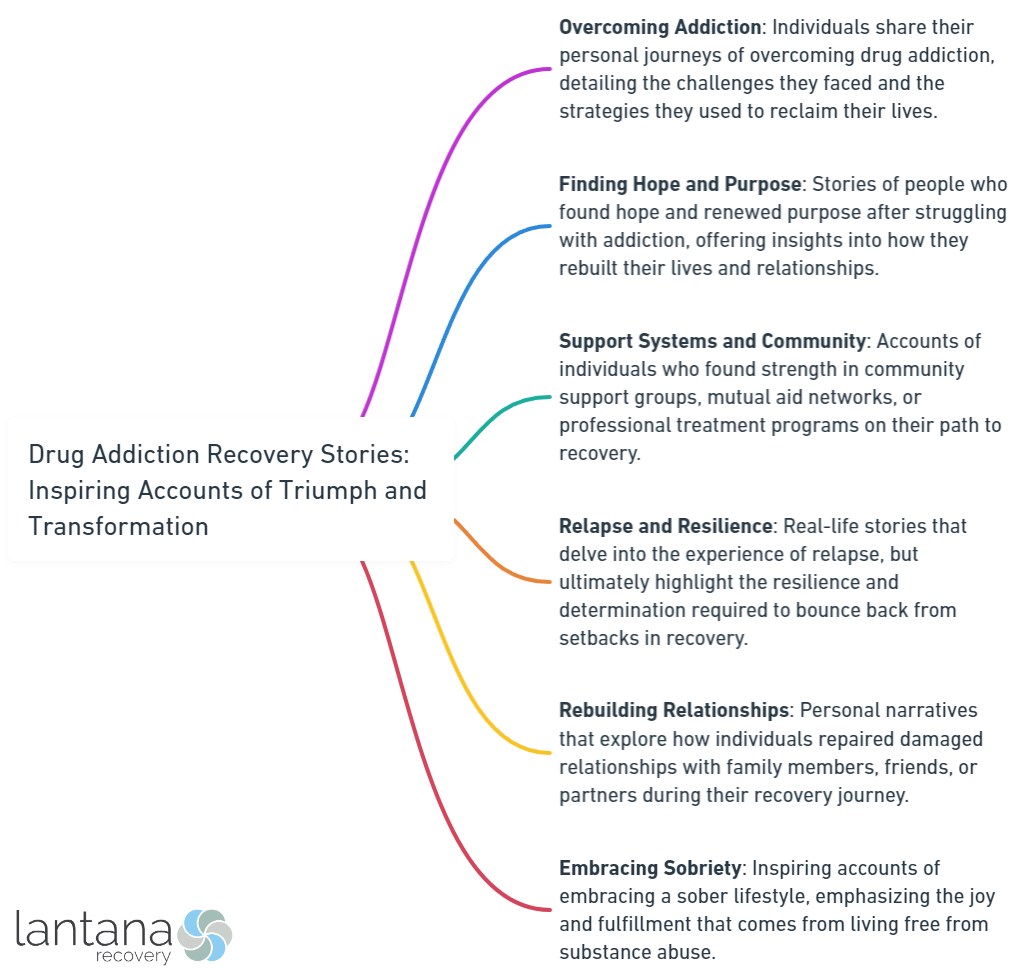Drug addiction is a complex issue that affects individuals and families worldwide. However, amidst the struggles and challenges, there are stories of triumph and transformation that inspire hope and ignite change. In this article, we delve into the world of drug addiction recovery stories, showcasing inspiring accounts of individuals who have overcome addiction and rebuilt their lives.
Personal stories of overcoming addiction serve as a powerful testament to the resilience of the human spirit. Through firsthand narratives, individuals share their experiences, shedding light on the challenges they faced, the lessons they learned, and the transformations they underwent on their journey to recovery.
Drug addiction recovery stories are important for several reasons. Firstly, they break the stigma surrounding addiction. By sharing their stories, individuals challenge the misconceptions and stereotypes associated with addiction, promoting understanding and empathy.
Furthermore, these stories provide hope and inspiration to those currently struggling with addiction. Reading about others who have successfully overcome substance abuse can instill a belief in one’s own ability to change and recover.
Common themes emerge from drug addiction recovery stories, including rock bottom moments that serve as wake-up calls, the turning point where individuals make the decision to seek help, and the importance of support and community in the recovery process.
Transformations and lessons learned are also significant aspects of recovery stories. Individuals often discuss rebuilding relationships, rediscovering self-worth and purpose, and embracing a life of sobriety.
These stories play a crucial role in helping others. They offer guidance and practical tips for those seeking recovery, sharing strategies that have worked for individuals on their personal journeys. Drug addiction recovery stories encourage individuals who are contemplating recovery to take the first step and seek the help they need. They also provide support for the loved ones of those in recovery, fostering understanding and offering insight into the process.

Overview of Addiction Recovery Stories
An overview of addiction recovery stories via the stages of the change model of addiction provides valuable insights and inspiration for individuals seeking recovery from drug addiction. Here are key points to consider:
- Inspiration: Addiction recovery stories inspire and motivate individuals struggling with addiction. These stories showcase the resilience and courage of those who have overcome their addiction, offering hope for others in similar situations.
- Personal growth: Addiction recovery stories highlight the journey of personal growth and transformation experienced by individuals on the path to recovery. These stories demonstrate the power of self-reflection, determination, and the ability to change one’s life.
- Sharing experiences: Addiction recovery stories allow individuals to share their experiences and provide support to others. They create a sense of community and foster understanding by connecting those in recovery and showing they are not alone in their struggles.
- Promoting understanding: Addiction recovery stories challenge and break the stigma surrounding addiction. They offer a societal perspective on the complexities of addiction, promoting empathy, compassion, and a more inclusive approach to recovery.
By understanding the overview of addiction recovery stories, individuals gain valuable insights, find inspiration, and feel supported on their journey to recovery.
Inspiring Accounts of Triumph and Transformation
Get ready to be inspired as we dive into the captivating world of triumph and transformation. In this section, we’ll delve into the mesmerizing personal stories of individuals who have conquered their battles with addiction. Brace yourself for tales of resilience, courage, and redemption as these brave individuals share their journeys of overcoming addiction. Get ready to be moved, uplifted, and amazed by their incredible stories of transformation. This is a section you won’t want to miss!
Personal Stories of Overcoming Addiction
Personal stories of overcoming addiction are incredibly impactful and inspiring. They serve as a testament to the remarkable resilience and unwavering determination of individuals who have triumphed over addiction. When reflecting on these narratives, it is crucial to consider a few significant factors.
- Inspiring stories: These personal accounts offer a beacon of hope and inspiration to those currently grappling with addiction. They serve as living proof that recovery is not only attainable but within reach for all.
- Courageous individuals: The individuals who bravely share their personal stories demonstrate immense courage and strength. By exposing their vulnerability, they provide solace to others who may be feeling isolated in their own arduous journeys.
- Personal growth: Those who have successfully conquered addiction underscore the incredible personal growth they have undergone. They candidly discuss the valuable lessons learned, the daunting obstacles confronted, and the transformative positive changes experienced.
- Fostering connections: These personal narratives establish meaningful connections among individuals who have shared similar experiences. By offering solace and support, they serve as a catalyst for seeking assistance and embarking on the path to recovery.
By immersing ourselves in these narratives, we gain valuable insights, encouragement, and the necessary drive for our own recovery endeavors. They serve as a poignant reminder that with unwavering commitment, unwavering support, and unwavering belief in oneself, overcoming addiction and embracing a fulfilling, sober life is entirely attainable.
Pro-tip: Consider joining support groups or online communities to discover a plethora of personal stories recounting the triumph over addiction. Hearing from a diverse range of individuals will provide you with a broader perspective and unwavering support throughout your own recovery journey.

Why Are Drug Addiction Recovery Stories Important?
Drug addiction recovery stories hold tremendous significance in society. They serve as powerful reminders of the triumphs and transformations that individuals can achieve in their battle against addiction. In this section, we will delve into the importance of these stories, focusing on two impactful aspects. Firstly, we will explore how drug addiction recovery stories help in breaking the stigma surrounding addiction. Secondly, we will discuss how these stories provide a much-needed source of hope and inspiration to those on their own recovery journey. Let’s dive into these compelling narratives of strength and resilience.
Breaking the Stigma Around Addiction
Breaking the Stigma Around Addiction is crucial in addressing the challenges faced by individuals struggling with addiction. Challenging societal perspectives and promoting understanding and compassion for those affected are important. Addiction recovery stories offer unique insight into the experiences of individuals who have overcome addiction, inspiring hope and transformation. These stories highlight the transformative effects of recovery and renew motivation for those who may be struggling.
By sharing personal experiences, addiction recovery stories help humanize addiction and shift the focus from judgment to empathy. They showcase the courage and strength of individuals who have faced the challenges of addiction and emerged victorious. Through their stories, they demonstrate that recovery is possible and that individuals should not be defined by their addiction.
Breaking the stigma around addiction also involves challenging misconceptions and stereotypes about addiction. Addiction recovery stories create opportunities for open and honest conversations by providing a platform for individuals to share their stories. They help educate the public about the complexities of addiction and the journey of recovery.
Providing Hope and Inspiration
Drug addiction recovery stories serve as a source of hope and inspiration for those who are struggling with addiction. These stories not only demonstrate that recovery is achievable, but they also shed light on the possibility of overcoming addiction. By hearing these stories, individuals are motivated to seek assistance and implement positive changes in their lives.
Throughout the recovery journey, it is common to encounter setbacks and experience doubt. However, stories of triumph and transformation act as a vital source of renewed motivation, reminding individuals of their inner strength and resilience.
Moreover, drug addiction recovery stories play a significant role in fostering understanding and empathy, as they help to dismantle the negative perception surrounding addiction. Through the sharing of personal experiences, these stories prompt society to perceive addiction as a treatable condition rather than a moral failing.

Common Themes in Drug Addiction Recovery Stories
Drug addiction recovery stories are a powerful testament to the resilience and strength of the human spirit as you work with leading experts like Greenville’s Lantana Recovery. In this section, we will explore the common themes that emerge from these compelling narratives. From the gripping rock bottom moments to the transformative turning points, and the importance of support and community, we will delve into the essential elements that pave the way for triumph and transformation in the face of addiction. Get ready to be inspired by the shared experiences and remarkable journeys of individuals who have reclaimed their lives.
Rock Bottom Moments
Rock bottom moments are crucial in overcoming drug addiction. These Rock Bottom Moments represent the lowest point in someone’s struggle with substance abuse and often involve intense despair, loss, and self-destruction. During these Rock Bottom Moments, individuals may realize the negative effects of addiction and become motivated to seek help and change.
Rock Bottom Moments can include setbacks and relapses, illustrating the cyclical nature of addiction. Severity can vary depending on factors like substance use, personal circumstances, and support systems. These Rock Bottom Moments can serve as wake-up calls, inspiring individuals to seek treatment and embrace recovery.
Though challenging, Rock Bottom Moments also offer opportunities for growth and transformation. They allow individuals to reflect on their choices, face the consequences of addiction, and commit to turning their lives around. These Rock Bottom Moments can mark a turning point toward sobriety, healing, and personal development.
Support from loved ones, support systems, and support group meetings plays a crucial role in navigating Rock Bottom Moments and maintaining recovery. These networks provide a safe space to share experiences and offer guidance, helping individuals rebuild their lives, develop healthy coping mechanisms, and build resilience.
Rock Bottom Moments are not the end, but rather a starting point to reclaim lives from addiction’s clutches. With commitment, perseverance, and the right support, individuals can rise from their lowest point, embrace sobriety, and build a future filled with hope, purpose, and fulfillment.
The Turning Point
The turning point in drug addiction recovery is a pivotal moment that brings about transformation, leading individuals to heal and recover. It occurs when individuals realize the destructive nature of their addiction and decide to make a change. This turning point can stem from hitting rock bottom, experiencing setbacks and relapses, or witnessing the consequences of their actions.
During the turning point, individuals undergo a transformative experience that goes beyond physical healing. It involves a spiritual and emotional journey where individuals confront the underlying issues contributing to their addiction. It is a profound self-realization that prompts them to seek support and make necessary changes.
One inspiring example of a turning point is John’s story. He struggled with substance abuse for years until a life-altering event made him realize he had hit rock bottom. With the support of a rehabilitation program, John embarked on a spiritual and emotional journey of self-discovery. Through therapy, counseling, and the guidance of peers, he was able to heal from his addiction and rebuild his life.
The turning point in drug addiction recovery serves as hope for others facing similar struggles. By sharing these stories, we promote understanding, inspire change, and provide renewed motivation for those seeking recovery. These stories encourage individuals to take the crucial step towards healing and empower them to overcome challenges on their journey.
Support and Community
Support and community are crucial in drug addiction recovery. Here are key aspects to consider:
- Support systems: A strong support system is essential in the recovery journey. This includes family members, friends, support group meetings, and organizations dedicated to helping individuals overcome addiction.
- Support network: Surrounding yourself with individuals who understand and empathize with your struggles provides emotional support and guidance. Connecting with others who have similar experiences can be comforting and inspiring.
- Peer support groups: Joining groups offer a safe space to share experiences, gain insights from those with long-term sobriety, and cultivate a sense of belonging. This may also include seeking support from family, church, friends, work, school, and self-help organizations like Alcoholics Anonymous and Narcotics Anonymous to aid in their recovery according to Judith Grant’s study, Rural women’s stories of recovery from addiction.
- Accountability partners: Having someone who holds you accountable for your actions and progress in recovery is helpful. An accountability partner offers encouragement, keeps you focused on goals, and provides guidance during challenging times.
- Therapeutic communities: Residential treatment centers and therapeutic communities offer a supportive environment where individuals can interact with peers who understand their struggles. These communities provide therapeutic activities and resources to enhance recovery.
By fostering strong support and community connections, individuals in recovery can find the encouragement, understanding, and guidance needed to overcome addiction and live fulfilling lives. Remember that each person’s journey is unique, and finding the right support system may take time, but it is worth the effort.

Transformations and Lessons Learned
Transformations and Lessons Learned – Hear inspiring recovery stories from individuals who have triumphed over drug addiction. Discover how they rebuilt relationships, found self-worth and purpose, and embraced sobriety. These powerful accounts of transformation will inspire and motivate you in your own journey toward recovery.
Rebuilding Relationships
Rebuilding relationships is crucial for individuals recovering from drug addiction. It involves restoring and strengthening connections with loved ones, repairing trust, and building a healthy support network.
- Healing past wounds: Rebuilding relationships requires addressing past conflicts with open communication, acknowledging mistakes, and working towards forgiveness and understanding.
- Building healthy boundaries: Setting clear boundaries is essential for maintaining healthy relationships. Individuals in recovery need boundaries that support their sobriety and well-being while respecting others’ needs.
- Developing healthy communication skills: Effective communication is vital for rebuilding relationships. Learning to express emotions and concerns respectfully can help rebuild trust and foster deeper connections.
- Attending family therapy or support groups: These resources provide a safe space for open dialogue, education, and guidance in rebuilding relationships. Strategies for improved communication, understanding addiction, and rebuilding trust are offered.
- Making amends: Taking responsibility, apologizing for harm caused, showing genuine remorse, committing to change, and making reparations when appropriate are essential steps in the recovery process.
Rebuilding relationships takes time and effort but is crucial for ongoing sobriety and overall well-being. Actively working on repairing connections allows individuals in recovery to cultivate a strong support system.
In my own experience, rebuilding relationships has been transformative. Through therapy and support groups, I learned communication skills, set boundaries, followed journal prompts for addiction recovery, took responsibility for my past actions, and committed to sobriety. This has allowed me to rebuild trust, strengthen relationships, and cultivate a supportive network. Rebuilding relationships has improved my personal life and contributed significantly to my overall well-being and ongoing sobriety.
Discovering Self-Worth and Purpose
Discovering self-worth and purpose is crucial for drug addiction recovery. It is essential for individuals to rediscover themselves and find meaning and direction in their lives.
Throughout the recovery process, personal growth and transformation occur. Individuals learn to celebrate their strengths and recognize their value. Discovering self-worth helps individuals develop a positive self-image and cultivate self-esteem and confidence.
Having a purpose is equally important. It provides individuals with a reason to continue their recovery journey and inspires positive changes. Finding purpose involves identifying new goals, pursuing passions, and contributing to communities. It allows individuals to create a new identity beyond addiction and establish a fulfilling life.
Therapy and counseling can greatly benefit individuals in recovery. Through therapy, they can explore their values, beliefs, and desires, which help them uncover their true passions and align their actions with their values. This further enhances their sense of self-worth and purpose.
By discovering self-worth and purpose, individuals in recovery gain hope and motivation. This newfound self-worth serves as a strong foundation for their ongoing journey of sobriety, empowering them to live a fulfilling life without addiction.
Embracing Sobriety
When recovering from drug addiction, embracing sobriety is crucial. It involves committing to a life free from addiction and actively maintaining sobriety. It begins with acknowledging the need for change and making a conscious decision to break free. It requires determination to overcome challenges and develop effective recovery strategies. Embracing sobriety is an ongoing journey that requires perseverance.
During recovery, individuals may encounter temptations and triggers that can lead to relapse. To avoid pitfalls, cultivating strong support systems and surrounding oneself with supportive people is crucial. Attending support group meetings and seeking professional help from leading rehab centers can greatly enhance the chances of maintaining sobriety.
Embracing sobriety also involves adopting new coping mechanisms and healthy lifestyle habits. This may include implementing stress-management techniques, engaging in regular exercise, and practicing self-care. Therapy or counseling from Lantana may also be beneficial for addressing the emotional and psychological aspects of addiction.

How Can Drug Addiction Recovery Stories Help Others?
Recovering from drug addiction can be a daunting journey, but the power of storytelling can offer hope, inspiration, and practical guidance. In this section, we’ll explore how drug addiction recovery stories have the potential to help others. From offering valuable guidance and practical tips to encouraging those seeking recovery, and providing much-needed support for loved ones, these stories embody the triumph and transformation that is possible. Get ready to be inspired by the transformative impact of these narratives on the path to recovery.
Offering Guidance and Practical Tips
When providing guidance and practical tips for drug addiction recovery, it is crucial to consider several strategies:
- Explore treatment options: Research and understand the available treatment options for drug addiction recovery. This includes inpatient and outpatient programs, counseling, therapy, and support groups.
- Develop effective recovery strategies: Personalize your strategies for recovery. Set short-term and long-term goals, practice self-care, and find healthy coping mechanisms.
- Utilize therapeutic benefits: Therapy, including individual counseling, group therapy, and alternative therapies like art or music therapy, can provide valuable support.
- Build a strong support network: Surround yourself with a supportive network of family, friends, and fellow individuals in recovery. Attend support group meetings, share experiences, and lean on others for guidance.
- Focus on relapse prevention: Develop strategies to prevent relapse. This may involve avoiding triggers, finding healthy outlets for stress, and creating a relapse prevention plan with your support network. “The goal of treatment is to help individuals recognize the early warning signs of relapse and to develop coping skills to prevent relapse early in the process, when the chances of success are greatest. This has been shown to significantly reduce the risk of relapse” (Relapse Prevention and the Five Rules of Recovery, Melemis, 2015.)
By following these guidance and practical tips, individuals in drug addiction recovery can increase their chances of success and maintain a healthy, fulfilling life in sobriety.
Encouraging Seekers of Recovery
When it comes to encouraging seekers of recovery, drug addiction recovery stories play a significant role. These stories inspire and motivate individuals on the path to overcoming addiction. Here are some ways in which drug addiction recovery stories provide encouragement:
- Instilling hope: Recovery stories showcase real-life examples of individuals who have successfully overcome addiction, demonstrating that recovery is possible and positive change is attainable.
- Offering guidance: Recovery stories provide personal insights and practical tips valuable to those seeking recovery. They offer guidance on treatment options, effective recovery strategies, and the transformative benefits of therapy.
- Connecting seekers with resources: Recovery stories direct seekers to addiction recovery resources such as support groups, treatment centers, and counseling services. These resources provide necessary support and guidance during the recovery journey.
- Promoting change and seeking treatment: Recovery stories encourage individuals struggling with addiction to seek treatment and support. They inspire seekers to take the first steps toward their own recovery by sharing stories of successful addiction recovery.
- Fostering understanding: Recovery stories break down the stigma surrounding addiction by promoting understanding. They showcase the challenges faced by individuals with addiction and highlight the importance of support and compassion in the recovery process.
In summary, drug addiction recovery stories are a powerful tool in encouraging seekers of recovery. They provide hope, guidance, and resources, and promote understanding, ultimately inspiring individuals to take the necessary steps toward their own recovery journey.
Providing Support for Loved Ones of Those in Recovery
When supporting loved ones in recovery, keep these considerations in mind:
- Stay informed: Educate yourself about addiction and the recovery process. Understanding the challenges and stages of recovery helps offer better support.
- Maintain open communication: Listen without judgment and encourage the expression of feelings and concerns.
- Be patient: Recovery is a journey that takes time. Offer support and encouragement during difficult times.
- Establish healthy boundaries: Set limits and communicate your own needs and limitations.
- Encourage self-care: Remind loved ones to prioritize their well-being and seek professional help if needed as studies like Mapping the recovery stories and drinkers and drug users in Glasgow by Best et al., have found that better functioning and quality of life were linked to increased involvement in meaningful activities, followed by the number of peers in recovery within the social network.
- Offer practical assistance: Provide rides to support group meetings, help with household chores, or aid in finding job opportunities.
Remember, supporting loved ones in recovery is crucial. By offering understanding, empathy, and practical assistance, you play a significant role in their ongoing recovery process.
Frequently Asked Questions
What are addiction recovery stories?
Addiction recovery stories are personal accounts of individuals who have struggled with drug or alcohol addiction and have successfully overcome their addiction. These stories highlight the challenges, setbacks, and triumphs of the recovery journey, offering hope and inspiration to others who may be struggling with substance abuse.
How do addiction recovery stories inspire change?
Addiction recovery stories inspire change by showcasing the possibility of healing and happiness after addiction. These stories provide hope to individuals who may feel trapped in their addiction, showing them that recovery is attainable. By sharing their experiences and insights, those who have overcome addiction encourage others to seek help, develop healthy coping strategies, and embark on their own journey of recovery.
Where can I find addiction recovery stories?
There are various online platforms where you can find addiction recovery stories. Social media communities, blogs, podcasts, and websites dedicated to addiction recovery often feature personal accounts of triumph and transformation. These platforms provide a space for individuals to share their recovery journeys, offering support, inspiration, and a sense of community.
What lessons can be learned from addiction recovery stories?
Addiction recovery stories teach important life lessons. They highlight the significance of self-reflection and accountability in the recovery process. These stories emphasize the value of finding support and treatment, as well as developing healthy life skills and coping mechanisms. They also underscore the role of building a support network and embracing spirituality in maintaining sobriety.
How can addiction recovery stories promote emotional healing?
Sharing personal addiction recovery stories can promote emotional healing in multiple ways. For those who have struggled with addiction, sharing their story can be a therapeutic experience, allowing them to reflect on their journey and find closure. For others, reading or hearing these stories can provide a sense of hope, validation, and connection, and help in their own healing process.
How can I give back and help others through addiction recovery stories?
If you have overcome addiction and want to give back and help others, sharing your recovery story is a meaningful way to inspire and support others. You can use online platforms such as social media, blogs, podcasts, or local support groups to share your story. By offering your experiences, insights, and advice, you can provide hope, encouragement, and guidance to those who are still struggling.









